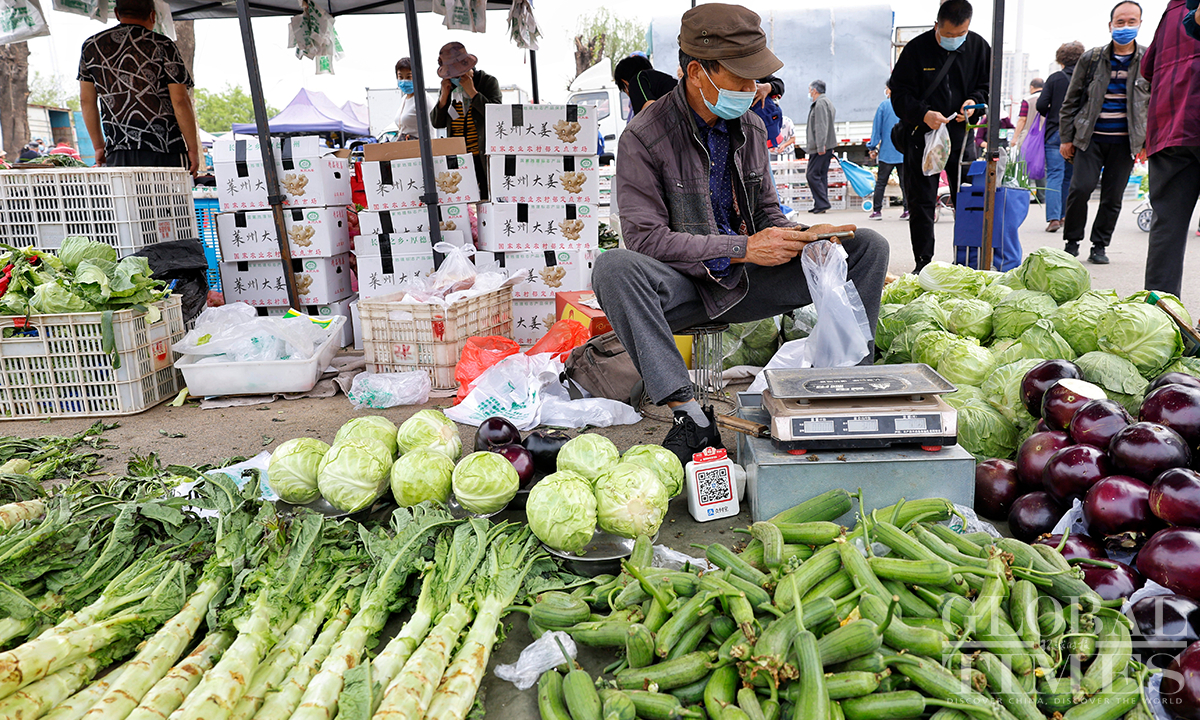
Photo: Li Hao/GT
As Beijing is caught up in a sudden COVID-19 surge in recent days, residents in the capital, particularly in Chaoyang district where most infection cases were found, have flooded supermarkets to stock up on food, drinks and other necessities in preparation for the epidemic.
In face of the surging demand, a number of sellers told the Global Times in the early morning of Monday that they have sufficient supplies, smooth purchasing channels, and the prices will remain stable except for a few items including pork of which the prices have slightly gone up.
The city's health authorities announced on Sunday's news conference that Chaoyang district, home to nearly 3.5 million, registered 11 new COVID-19 infections between Saturday afternoon and Sunday afternoon. Among the cases were middle school students, their teachers and relatives. Two residential communities in Chaoyang district were labeled as a high-risk and medium-risk region for COVID-19 on Sunday.
As the district is set to roll out three rounds of nucleic acid testing on all residents starting Monday, some worried that certain areas may be put under lockdown and supplies might be an issue considering that residents in Shanghai experienced food shortages in the initial phase of the coronavirus epidemic.
Although some markets in Chaoyang have experienced temporary shortage of supplies on Sunday evening, the Global Times found that they have all replenished the shelves and are confident to meet the high demand from the public.
A seller at a community fresh food supermarket in Chaoyang told the Global Times that he saw people rushing in and snatching up vegetables and meats last night, and the market extended service hours from 7:30 pm to 9:00 pm.
A farmer's market, a prominent choice for residents in the surrounding areas to refill their refrigerators, appeared to be more crowded than usual on Monday morning.
An owner surnamed Xin who sells seafood at the market said that he has prepared more than twice the amount than usual, especially the amount of seafood suitable for long-term storage such as scallops and yellowtail. Customers are buying significantly more than usual as well.
Butcher shop owner Zhang said he did not expect to see so many customers today and the good meats were already sold out by 8 am in the morning. Prices have slightly gone up from 19 yuan/kg ($2.9/kg) to 22 yuan/kg.
Sales staff said that the purchase channels are smooth at the moment, and there is no need to stock a lot. Their purchase channels are mainly Xinfadi and other major wholesale markets. The daily supply of vegetables in Xinfadi market, which is the biggest wholesale market in the capital, reportedly remains at 19,000 tons, sufficient to satisfy surging public demand.
As the Global Times reporters visited a number of other supermarkets across the city around Monday noon, the "hoarding tide" among Beijingers has gradually calmed down as shops restored their usual status.
A customer surnamed Liu who visited one of Beijing's largest supermarket chain stores, Wumart, said that Beijing's epidemic prevention measures have always been strict, and he thought it was unnecessary for people to snatch up goods, expressing faith in Beijing's supply capability.
Fresh Hema, one of the top retailers in China run by e-commerce giant Alibaba, told the Global Times that all the 40 membership stores in Beijing are well supplied and have allocated more than 200 tons of daily foods at direct sourcing bases in the neighboring East China's Shandong Province and North China's Hebei Province to increase supply. The overall stocking of groceries has been increased to four to five times the daily amount, with all prices remaining stable.
To ensure the products delivered to residents are fresh, the supplies are put on shelves in batches, which are replenished more than three times the usual daily amount.
Online orders of Fresh Hema have also seen a significant rise. In order to deliver the goods to households as soon as possible, the company has added a large number of staff in Beijing.
At the Fresh Hema store, couriers were seen everywhere running to each shelf to pick up goods with dozens of booking tickets in their hands, with some holding as many as 60 tickets.
Other main retailers in Beijing, such as Walmart and Sam's Club, have also urgently increased livelihood supplies to nearly three times the amount of usual stocks, the Global Times has learned on Monday.
Suning, one of the retail logistics companies in China even allocated products like refrigerators, printers, fans, rice cookers to meet surging demand.
The Beijing Municipal Commercial Affairs Bureau stressed on Sunday that supplies of daily necessities are sufficient in Beijing and traffic links to goods supplies are operating normally.
Households should stock up on supplies properly as there is no need for panic hoarding. We can trust Beijing's ability to guarantee supplies which is safeguarded by the city's well-established supply reserving system since the SARS in 2003, experts said.
An area in Chaoyang district, where most infection cases were found, has upgraded its epidemic countermeasures on Monday, asking all residents in the area not to leave their communities and requiring personnel employed in the area to work from home.
Welfare institutions and nursing homes will be put under closed-loop management. Public venues including restaurants, stadiums, cinemas, and museums will also be temporarily closed.
Supermarkets, hospitals and other venues of public service will remain open as usual, officials said.
People in the closed-off areas will receive two weekly nucleic acid tests, one on Monday and one on Wednesday. If results turn out negative, the temporary lockdown will be lifted.




